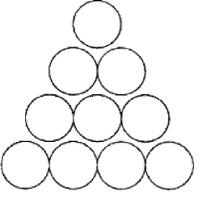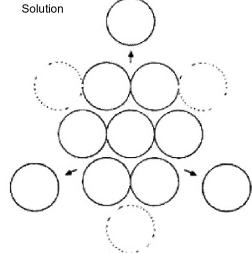August 3, 2009
The Best Way To Improve Your Creativity

Moving only three circles, make the overall triangle point downward.
Spend a few minutes on it before reading the hint.
Hint: this is part of a psych test developed by University of Texas students enrolled in a study abroad program in China.

Scientific American has an article An Easy Way To Increase Creativity, which describes the recent paper about the effects of psychological distance on creativity.
The SciAm article is worth reading. Students were asked a series of brain teaser questions. One group of students was told that the questions were invented at their university; the other group was told they were invented in a far away university. Thinking that the test came from far away somehow raised the creativity of the subjects. They answered more questions correctly.
But in this paper, the researchers told the subjects that there was a psychological distance involved. How would you do this to yourself?
One way would be to imagine the question came from far away, or form another time. Another way would be to imagine you were far away from where you are now (e.g. answering while on a vacation in Hawaii).
But I'm going to illustrate another way-- the way I personally use on complicated problems and in writing a lot of the posts in this blog.
II.
Answer this question as fast as you can:
Name ten animals.Note carefully your answer. Most likely, your first 6 or so answers are of one category of animal (e.g. farm), and the remaining ones are from another category of animal (e.g. zoo animals).
Even dementia patients can name a lot of animals-- "cow, pig, horse, sheep, umm, cow, no wait, ummm...." but what the demented can't do well is switch to another category. They get stuck in the same box, looking around in there for more answers. They don't lack fluency, they lack flexibility.
So knowing the answer to "name 300 animals" isn't about knowing 300 animals, it is about knowing 30 categories of animal, and being able to jump from one to another.
Imagine you are on your 200th animal, and now you are stuck-- you can't even think of any new categories.
Creativity advice is often of the form, "look at it a different way." Ok, but I don't even know what way to look at it to start trying for a new kind of solution.
Here's my trick: imagine you are someone else answering the question.
Who that someone else is depends a lot on what you're trying to do. Sometimes I pick a person related to question (e.g. The Crocodile Hunter guy); sometimes I pick a guy unrelated but clever person (e.g. Stewie from Family Guy). It can't be a generalization of a person ("how would a biologist answer?") it has to be a real person that I know enough about to model their thinking, but different enough from me that alternative answers are possible. But I don't linger, I don't force the guy to answer if he can't; I cycle through multiple identities to get quick looks at the problem. (Why this method works is explained a little more fully here.)
A prisoner was attempting to escape from a tower. He found a rope in his cell that was half as long enough to permit him to reach the ground safely. He divided the rope in half, tied the two parts together, and escaped. How could he have done this?This question is from the paper, and I couldn't answer it-- but Jack Bauer did. Silly, I guess, on some level, but I chose a guy who would know how to escape from towers, and the solution then came almost immediately. It's more than just "what would Jack do?" It's about being that other person, what would I do if I was him-- I imagined myself harried and relentless, pausing only to say "dammit!" I need to get her out of here, and I need to get her out now--
so I frantically split the rope lengthwise, tie the ends together and to the window, grab her by the waist, and jump--------
II Addendum/clarification:
(some have commented that splitting the rope wouldn't hold a person. Others commented that "getting in someone's head" is BS.)
The idea isn't to think, "what would Jack Bauer do?" It is to think, "what would I do if I was Jack Bauer" because the goal isn't to get out of a tower, it is to answer a brain teaser.
Trying to think like you as Jack Bauer allows your own mind to have one more method of thinking, it adds a new road. Taking yourself out of the process, "what would Jack do?" limits your thinking, it limits it only to the mind of Jack Bauer.
For example: Jack Bauer himself wouldn't split the rope and tie both ends, because Jack Bauer knows this wouldn't work, because he knows ropes. I don't. But allowing myself his brain gives me abilities to think of things and in ways I wouldn't previously.
Again, the point is to boost my creativity, to help my brain to think with additional software, not to replace the existing software.
And you only do it for moments at a time. If thinking like Jack Bauer failed-- after a few seconds, because I'm really looking only for flashes of inspiration-- then I would have moved on to another person.
III.
Note also that my inclination is towards psychology; another person might be able to establish creative reference points by translating the question into a different language, or imagining it printed in different color, or font; or answering it using thinking from different eras, etc.
But effective methods of adopting psychological distance or alternative perspectives have two important similarities. They are predicated on the idea that who you are, and how your mind works, can be artificially altered at will-- you can actually think thoughts you were neither biologically nor environmentally primed to think; and they establish that an inability to see things from another perspective is almost always a failure of will, not of intellect.
----
http://twitter.com/thelastpsych
27 Comments